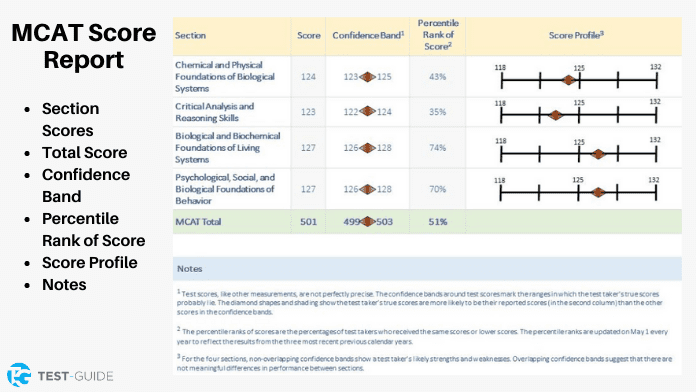Curious about MCAT scores and whether you got a good score? A good MCAT score is anything above 511. This would put you in the 80th percentile (we review MCAT score percentiles below).
Being in the 80th percentile would make you competitive for a ton of medical schools and give you a great chance at getting into a program.
However, a good MCAT score is different for everyone. Students who want to get into a top program will need a higher MCAT score versus someone who just wants to get into any medical school.
| Average Score for Some Med Schools | Average Score for Most Med Schools | Average Score for Top Med Schools | |
|---|---|---|---|
| Description | Average | Good | High |
| Percentile Rank | 50th Percentile | 80th Percentile | 95th Percentile |
| Total MCAT Score | 501 | 511 | 518 |
A good MCAT score is anything above 511.
If you want to ensure you get a top MCAT score, take our free MCAT test to prepare.
MCAT Scoring
The highest MCAT score is 528. Each of the 4 sections are scored separately on a scale from 118-132. Those scores are then added together to arrive at the final composite score.
The scaled scores for each section are derived from your raw score on that section. Your raw score is the number of questions you answered correctly. Scaled scores are used because they consider the difficulty of each question.
MCAT Score Range
The MCAT score range is 472–528. There are 2 MCAT score ranges students should be aware of:
- Section Score Range: Ranges between 118 and 132. This is the score you will be given on each of the 4 sections of the exam.
- Total MCAT Score Range: Adds up each section score and gives you a total score. The total MCAT score range is 472 to 528.
MCAT Percentiles
On your score report, you will receive a percentile rank. MCAT percentiles are used to compare your score to other test-takers.
If you scored a percentile rank of 70%, that means you scored better than 70% of other test-takers. The higher your percentile, the better.
| Total Score | Percentile Rank |
|---|---|
| 524-528 | 100 |
| 522 | 99 |
| 520 | 97 |
| 518 | 95 |
| 516 | 92 |
| 514 | 88 |
| 512 | 83 |
| 510 | 78 |
| 508 | 72 |
| 506 | 66 |
| 504 | 59 |
| 502 | 52 |
| 500 | 46 |
| 498 | 39 |
| 496 | 33 |
| 494 | 28 |
| 492 | 23 |
| 490 | 18 |
| 488 | 14 |
| 486 | 11 |
| 484 | 8 |
| 482 | 5 |
| 480 | 3 |
| 478 | 2 |
| 476 | 1 |
| 472-474 | <1 |
Average MCAT Scores
The average MCAT score throughout the last 6 years hovers around 506. View the table below to see the total average MCAT score as well as the average score for each section of the exam.
| Section | 2023-2024 | 2022-2023 | 2021-2022 | 2020-2021 |
|---|---|---|---|---|
| CPBS | 126.4 | 126.4 | 126.3 | 126.5 |
| CARS | 125.8 | 125.8 | 125.7 | 125.9 |
| BBLS | 126.6 | 126.8 | 126.7 | 126.8 |
| PSBB | 127.8 | 127.5 | 127.3 | 127.2 |
| Total Score | 506.3 | 506.5 | 505.9 | 506.4 |
Take our free MCAT prep tests to raise your score and ensure you get into the program of your choice.
MCAT Score Report
Every student will receive a score report after taking their exam. The score report will include the following:
- Section Scores
- Total Score
- Confidence Band
- Percentile Rank of Score
- Score Profile
- Notes

Acceptance Rates and MCAT Scores
Review the table below to see how different MCAT scores correlate to medical school acceptance rates. This data is from the last 6 years.
| MCAT Score | Percent Accepted to Med School |
|---|---|
| Less Than 486 | 0.7% |
| 486-489 | 1.3% |
| 490-493 | 3.6% |
| 494-497 | 11.6% |
| 498-501 | 20.9% |
| 502-505 | 31.9% |
| 506-509 | 41.7% |
| 510-513 | 57.1% |
| 514-517 | 68% |
| Greater than 517 | 78.1% |
The higher score you have, the better chances of acceptance you have for medical school. A score of 510+ gives you a 57.1% chance of getting into medical school. Remember, your score is one of many factors in your medical school application.
Frequently Asked Questions
What is the highest MCAT score?
The highest MCAT score is 528. This means you would have a perfect score of 132 on all sections of the exam.
What is the MCAT out of?
The MCAT is out of 528 points. You will receive a total score between 472-528.
What is the average MCAT score?
The average MCAT score throughout the last 6 years hovers around 506.
If you scored poorly, can you retake the MCAT?
You can take the exam up to 3 times in one calendar year and up to 4 times across two calendar years.

